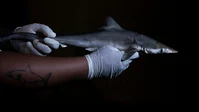New analysis of Brazilian sharpnose sharks has revealed that the illicit drugs are getting into the ocean and contaminating the fish, a first-of-its-kind discovery.
For the study, researchers dissected 13 sharks captured accidentally by fishermen between September 2021 and August 2023 in the waters off Recreio dos Bandeirantes, a Rio de Janeiro neighborhood with long, pearly-white beaches.
The team found cocaine and benzoylecgonine—a metabolite produced when cocaine is broken down in the body—in muscle and liver tissues of all 13 fish. (See the surprising ways sharks keep our oceans healthy.)
Pharmaceutical waste, whether it's legal or illegal, is an understudied problem for wildlife in oceans, rivers, and lakes. Scientists have also detected traces of coke and other illegal drugs near large cities such as London and off Florida's coast.
It's not yet known how cocaine—a stimulant sourced from coca leaves—could affect the Braziian sharpnose shark, a species the International Union for Conservation of Nature lists as vulnerable to extinction, due mostly to overfishing.
Biologist Rachel Ann Hauser-Davis and ecotoxicologist Enrico Saggioro, both at the Oswaldo Cruz Institute, a federal public health research organization in Rio de Janeiro, noted they did not analyze the sharks' health in their new study.
But negative effects are "probable," the study authors say, based on previous studies that have shown damage to zebrafish and mussels exposed to cocaine. Other research on fish eyes found the drug can affect the animals' vision and ability to hunt, they say.
"There are several issues concerning their health, such as possible reproductive issues, as well as problems in prey-predator interactions," say the two scientists, whose study is in press in the journal Science of The Total Environment.
The study also revealed the 13 sharks had about three times higher levels of cocaine than benzoylecgonine, which means that the drug had mostly not been metabolized in the bodies of humans or other organisms—instead, some of it may have been dumped directly into the water.
"While I'm not at all surprised to see cocaine metabolites in the water, as you'd expect that from human urine, I am surprised to see 'cocaine' in the water," says Tracy Fanara, an oceanographer at the University of Florida.
Brazil is one of the main "cocaine consumer markets in South America, with around 1.5 million users, representing almost eight percent of total users worldwide," according to the study.
Study scientists believe there are two ways cocaine is getting into fish: Waste from drug users' bodies entering the sewage system, as well as "clandestine" cocaine-refining laboratories disposing pure cocaine into sewage ducts along the Sernambetiba Canal, which empties into the ocean at Recreio dos Bandeirantes.






 Sharks in Brazil
Sharks in Brazil  found with cocaine in their systems. How did that happen?
found with cocaine in their systems. How did that happen? 




Jump in the discussion.
No email address required.
Maybe they just ate a cokehead.
Jump in the discussion.
No email address required.
More options
Context